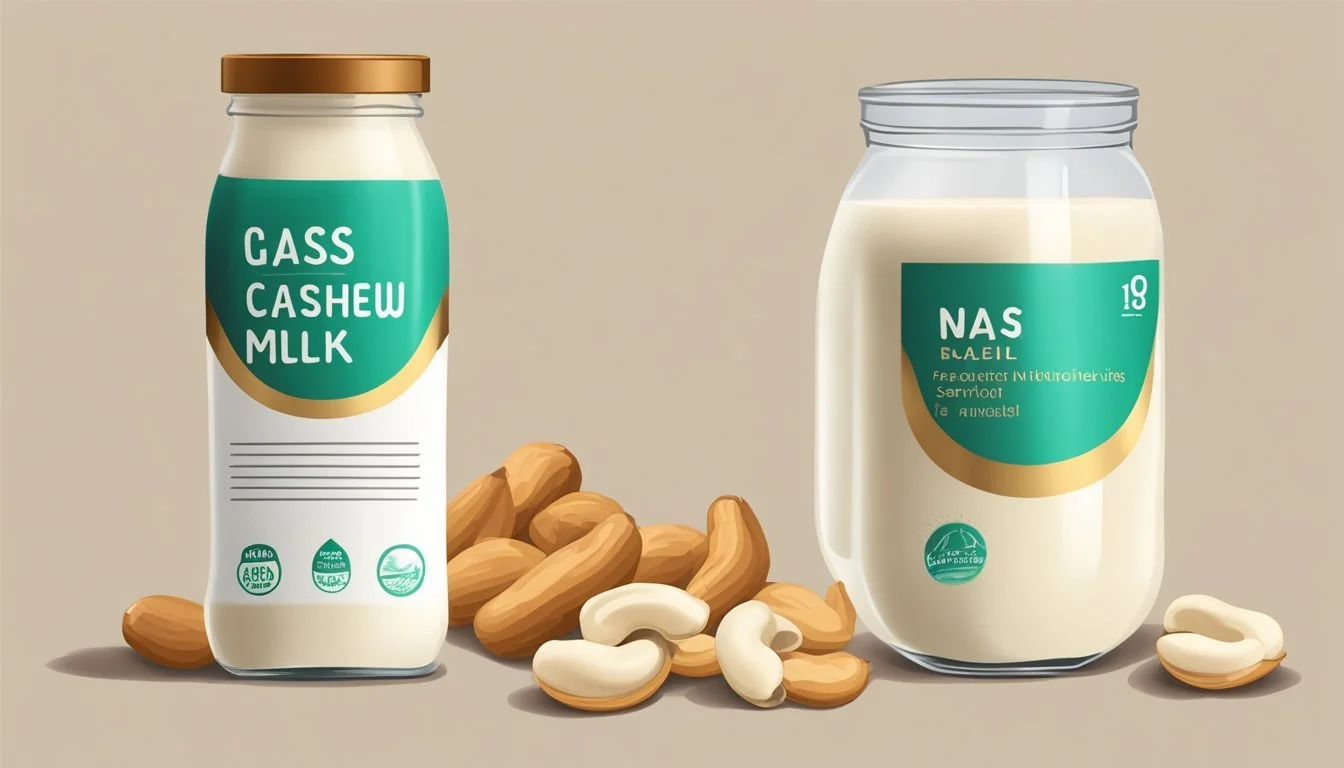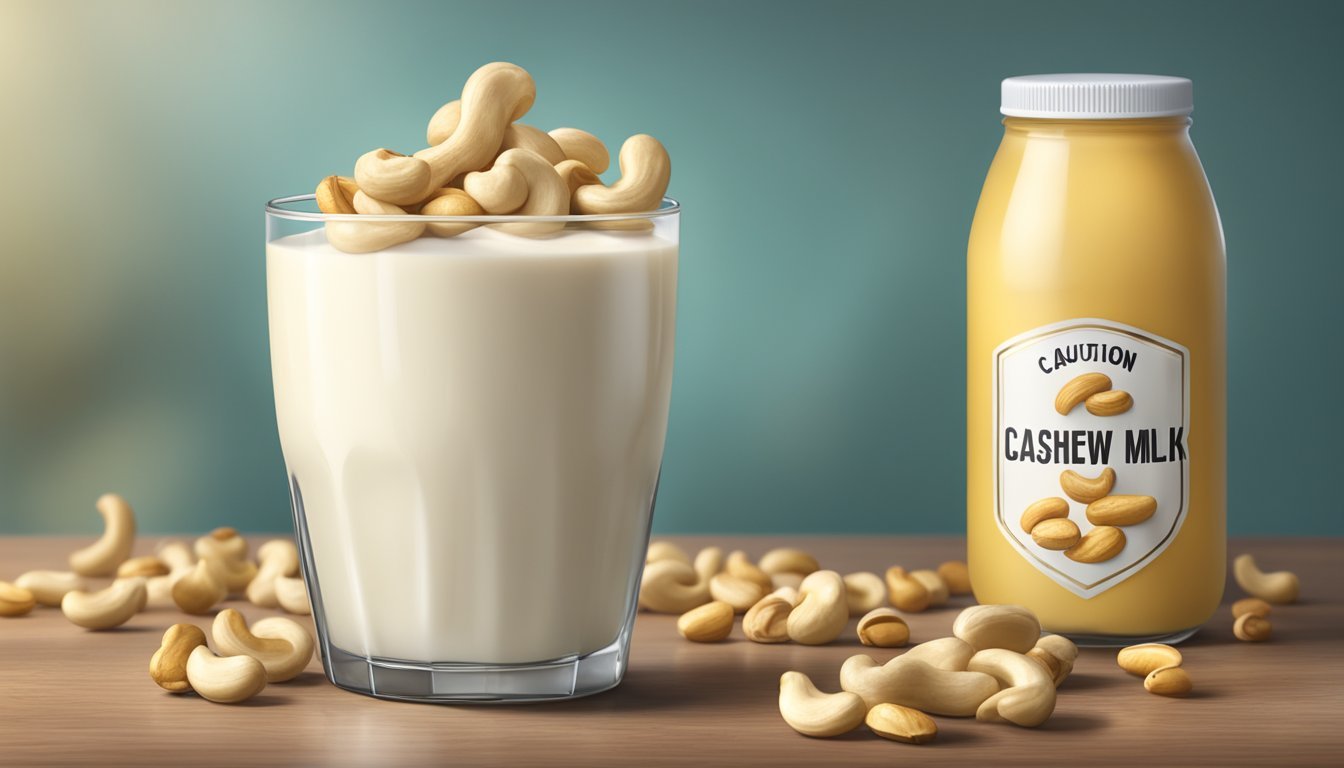How Many Servings of Cashew Milk Is Too Much
A Nutritional Guide
Cashew milk has become increasingly popular for those seeking dairy-free alternatives. While it boasts numerous health benefits, such as being rich in essential nutrients and often lower in calories compared to cow's milk, it’s essential to consume it in moderation. Experts recommend limiting cashew milk intake to about two servings per day to avoid potential nutritional imbalances and ensure you get enough protein from other sources.
Cashew milk, unlike cow’s milk, is notably low in protein, which could be a concern for those relying on it as a primary milk substitute. This means that individuals need to be mindful of their overall dietary protein intake. Overconsumption of cashew milk may also pose risks for those with nut allergies or sensitivities.
Understanding the limit of cashew milk consumption helps maintain a balanced diet and reaps the benefits without unintended drawbacks. For anyone integrating cashew milk into their daily routine, staying informed and mindful can make all the difference to maintaining a healthy lifestyle.
Understanding Cashew Milk
Cashew milk is a popular dairy-free milk alternative made from cashews. It offers a creamy texture and a mildly nutty flavor that appeals to many.
Cashew milk is rich in nutrients such as healthy fats, protein, and fiber. These elements contribute to its nutritional profile.
A single serving can provide various vitamins and minerals important to health. These include magnesium, copper, zinc, selenium, vitamin K, and calcium.
Nutritional Composition
Nutrient Amount per serving (1 cup) Calories ~60-70 Protein ~1-2 grams Total Fats ~4-5 grams Fiber ~0.5 grams Calcium ~20-30% of daily value Magnesium ~10-15% of daily value Vitamin K ~10-15% of daily value
Cashew milk contains unsaturated fats which are beneficial for heart health. The presence of magnesium aids muscle function and bone health.
Copper and zinc play roles in immune function and enzymatic reactions. Selenium acts as an antioxidant, helping to protect cells from damage.
Cashew milk can be used in various recipes, adding creaminess without the lactose found in dairy milk. This makes it suitable for those with lactose intolerance.
Flavor and Uses
Cashew milk’s mild flavor makes it versatile in both sweet and savory dishes. It can be used in smoothies, soups, baking, and as a coffee creamer.
Overall, cashew milk is a nutrient-dense option for those seeking a plant-based milk alternative.
Nutritional Profile of Cashew Milk
Cashew milk offers a balanced nutritional profile with low calories and a variety of vitamins and minerals. It is lactose-free, making it suitable for those with lactose intolerance.
Calories and Macronutrients
Cashew milk is relatively low in calories. A single cup typically contains around 24-25 calories. This makes it a calorie-saving option compared to cow’s milk.
In terms of macronutrients, cashew milk has about 1 gram of protein and 2 grams of fat, primarily unsaturated fats. It contains minimal carbohydrates, usually around 2 grams per serving, and has no dietary fiber.
The low-calorie content and fat profile make cashew milk a good choice for those watching their calorie intake.
Vitamins and Minerals Content
Cashew milk is rich in several essential vitamins and minerals. It provides a good amount of vitamin K, which aids in blood clotting. Additionally, it contains moderate levels of magnesium, calcium, and potassium, which are crucial for bone health, muscle function, and maintaining healthy blood pressure.
Iron is another important mineral present in cashew milk, supporting oxygen transport in the blood. Although homemade versions may lack some nutrients found in store-bought options, the fortification process typically adds vitamins A, D, and B12.
Comparison to Other Nut Milks
Compared to other nut milks such as almond, walnut, and hazelnut milk, cashew milk has a similarly low-calorie count. A cup of almond milk usually has around 30-35 calories, while walnut and hazelnut milk have slightly higher calorie counts.
In nutrient comparison, almond milk offers more vitamin E, while walnut milk has higher omega-3 fatty acids. Cashew milk's advantage lies in its creamy texture and mild flavor. Like most nut milks, it is free from lactose and suitable for those with dairy allergies or intolerances.
The choice between these options depends on individual nutritional needs and taste preferences.
Health Benefits of Cashew Milk
Cashew milk offers several health benefits due to its nutrient-rich profile. These benefits include supporting heart health, aiding weight management, regulating blood sugar, and promoting digestive health.
Heart Health Advantages
Cashew milk is beneficial for heart health due to its high content of unsaturated fats, which help reduce bad cholesterol (LDL). These fats are essential for lowering the risk of heart disease, heart attack, and stroke. Additionally, fortified cashew milk often contains calcium and vitamin D, both crucial for maintaining heart function and reducing hypertension.
The presence of magnesium in cashew milk also contributes to heart health by helping to relax blood vessels, reducing blood pressure. Antioxidants in cashew milk protect the heart by fighting oxidative stress.
Weight Management Features
Cashew milk is lower in calories compared to other milk alternatives, making it a useful option for weight management. A single serving can contribute to a feeling of fullness due to its healthy fats content. This can help in reducing overall calorie intake.
Furthermore, it contains fiber, which aids digestion and keeps hunger pangs at bay. Including cashew milk in a balanced diet can support weight loss efforts without sacrificing vital nutrients.
Regulation of Blood Sugar
The low carbohydrate content of cashew milk makes it an excellent choice for individuals managing diabetes. It helps in preventing spikes in blood sugar levels. The magnesium content in cashew milk further aids in improving insulin sensitivity, thereby enhancing glucose metabolism.
In addition, the healthy fats in cashew milk slow down the absorption of sugar into the bloodstream, which helps maintain stable blood sugar levels throughout the day.
Digestive System Support
Cashew milk supports digestive health due to its fiber content. Fiber is crucial for preventing constipation and maintaining regular bowel movements. It also plays a role in preventing colon cancer by promoting a healthy gut environment.
Moreover, cashew milk is lactose-free, making it suitable for people with lactose intolerance, reducing the likelihood of digestive discomfort. Consuming cashew milk can ensure that individuals get essential nutrients without the adverse effects associated with dairy.
Incorporating cashew milk into the diet can thus provide multiple health benefits, from heart health to improved digestion.
Potential Risks and Considerations
While cashew milk offers a dairy-free alternative with many benefits, it is essential to be aware of possible risks. Specific concerns include nut allergies, the higher calorie content of sweetened varieties, sodium levels in commercial brands, and the balance of phosphorus and calcium.
Nut Allergies and Sensitivities
Cashew milk can trigger allergic reactions in individuals with nut allergies, specifically those allergic to cashews. Symptoms may range from mild itching and swelling to severe anaphylaxis. It's crucial for people with known nut allergies to avoid cashew milk entirely. Cross-reactivity with allergens like poison ivy is also possible due to similar proteins found in both cashew nuts and poison ivy.
High-Calorie Content in Sweetened Variants
Sweetened cashew milk can contain significant amounts of added sugars, leading to increased calorie intake. A cup of sweetened cashew milk may have 60-80 calories, compared to 25-30 calories in the unsweetened version. Regular consumption of sweetened variants can contribute to weight gain and affect overall nutrition, especially if consumed in large quantities.
Sodium Content in Commercial Brands
Commercially available cashew milk often contains added sodium to enhance flavor. Excessive sodium intake can lead to high blood pressure and other cardiovascular problems. Standard brands may contain anywhere from 100-200 milligrams of sodium per serving, making it essential for consumers to read labels and opt for low-sodium versions when possible.
Phosphorus and Calcium Balance
Cashew milk is lower in phosphorus and calcium compared to cow's milk. Phosphorus and calcium are crucial for bone health, and an imbalance can affect bone density. People relying on cashew milk may need to supplement these minerals through other dietary sources or fortified versions of cashew milk to maintain adequate levels.
Consumption Recommendations
When it comes to cashew milk, finding the right balance is crucial for health and wellness. Factors such as moderation, serving sizes, and dietary integration play significant roles.
Moderation and Serving Sizes
Moderation is key when consuming cashew milk due to its higher calorie content compared to other plant-based milks. A typical serving size is one cup, which provides essential nutrients but must be balanced within the daily calorie intake.
One serving of nuts, including cashew milk, supports heart health and aids in weight management when consumed in appropriate amounts. For those managing cardiovascular disease or diabetes, attention to serving sizes helps maintain healthy blood pressure levels and overall health.
Integrating with a Balanced Diet
Integrating cashew milk into a balanced diet requires variety and mindful selection of complementary foods. Pairing cashew milk with nuts, seeds, fruits, and fish can create a nutritious and diverse diet.
Maintaining equilibrium between daily calories and nutrient intake ensures optimal health benefits. Using cashew milk in smoothies, cereals, or as a healthy snack in trail mixes allows for creative and nutritious meal planning.
Alternatives and Varieties
Considering alternatives and varieties ensures that nutritional needs are met without over-reliance on a single source. While nut butters and other nut-based products provide similar benefits, rotating between almond milk, oat milk, and soy milk offers different nutrient profiles and flavors.
For those concerned about calorie intake, selecting low-fat or unsweetened versions of cashew milk can help maintain weight management goals. Incorporating such alternatives helps diversify dietary options and prevent nutrient imbalances.
Special Diets Consideration
For individuals on special diets, such as vegetarians or those with specific health conditions, cashew milk offers a valuable source of protein and healthy fats. However, attention must be paid to potential allergies, as cashew nuts can trigger reactions in some people.
Those focused on heart health or managing diabetes might find cashew milk beneficial when consumed in moderation. Knowing the nutritional content and balancing it with other dietary components ensure that cashew milk enhances rather than hinders overall well-being.
Culinary Uses of Cashew Milk
Cashew milk, made from blending cashews with water, is a creamy and nutrient-dense alternative to dairy milk. It can be used in various culinary applications, from cooking and baking to beverages and toppings.
Cooking and Baking
Cashew milk's creamy texture makes it perfect for both savory and sweet dishes. It can be used as a base for soups, adding richness without extra calories. In sauces, it serves as a healthy substitute for heavy cream, providing a smooth consistency.
For baking, cashew milk's mild flavor ensures it won't overpower other ingredients. It's especially useful in recipes for cakes, muffins, and pancakes. Incorporate it into batters and doughs to maintain moistness and add subtle nuttiness.
Additionally, cashew milk can replace dairy milk in custards, puddings, and ice creams. Its natural sweetness enhances the taste of desserts while contributing healthy fats and essential nutrients.
As a Beverage
Cashew milk is delicious on its own or as part of various drinks. It can be enjoyed chilled, offering a refreshing alternative to traditional milk. For coffee enthusiasts, it makes a creamy addition to lattes and cappuccinos.
Smoothies benefit from cashew milk's thick, velvety texture. It blends well with fruits and vegetables, adding nutritional value and enhancing the overall flavor profile.
Another popular use is in hot beverages like tea and hot chocolate, where it provides a rich, luxurious mouthfeel. Its versatility makes it suitable for anything from protein shakes to specialty drinks.
Toppings and Condiments
When used as a topping, cashew milk can elevate the flavor and texture of many dishes. Pouring it over cereal or granola adds a smooth, creamy quality. For oatmeal and overnight oats, it offers a richer, more satisfying experience than water or dairy milk.
In salad dressings, cashew milk mixed with spices and oils creates a nutrient-dense, flavorful spread. It can also be used to make cashew butter, a creamy spread perfect for toast or fruit.
Additionally, it serves as an excellent base for sauces and dips. Mixed with herbs and spices, cashew milk can transform into versatile condiments, perfect for roasted vegetables or as a spread on sandwiches.







